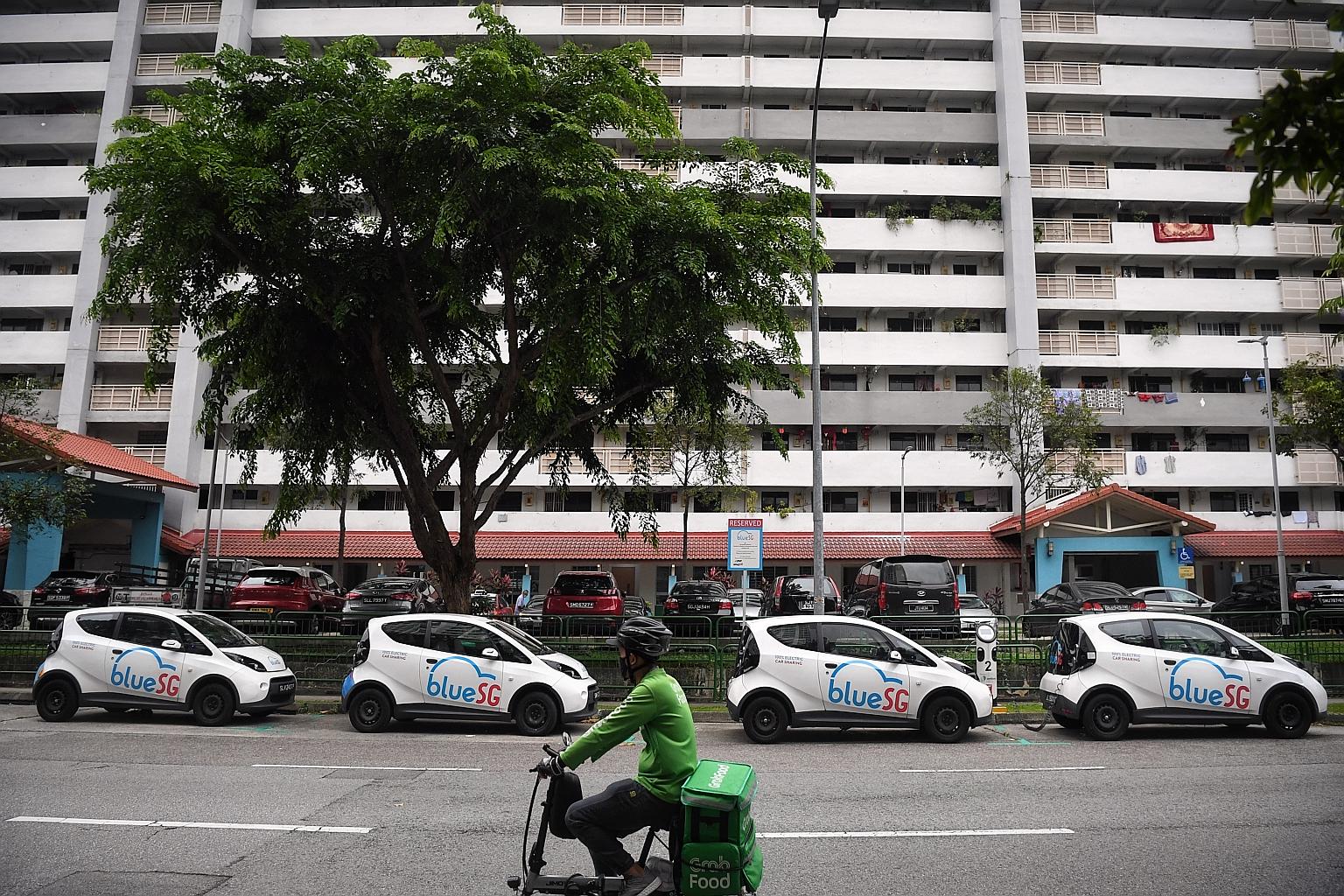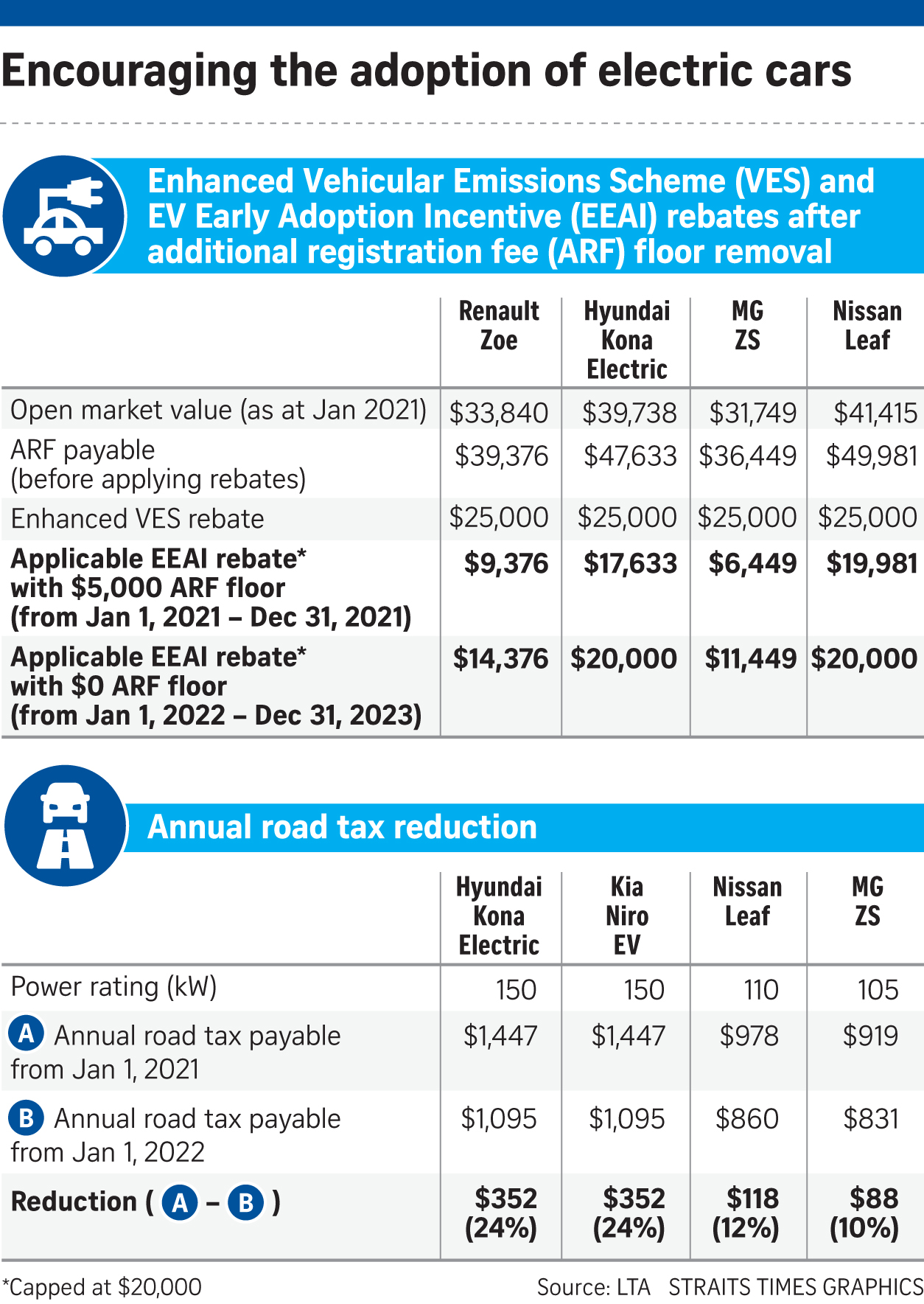Parliament: Singapore’s sustainability plans
Road tax for mass-market electric cars to be lowered from next year
This will keep it on a par with tax for similar car models driven by combustion engines
Sign up now: Get ST's newsletters delivered to your inbox

Some 40,000 of the 60,000 charging points for electric vehicles being built by 2030 will be in public and Housing Board carparks, with the remaining on private premises. The majority will be normal or slow chargers, as these can be rolled out without extensive and costly changes to the power grid.
ST PHOTO: KUA CHEE SIONG
Follow topic:
Road tax for mass-market electric cars will be lowered to be on a par with that for similar models driven by combustion engines from next year, removing yet another hurdle to the adoption of these cleaner vehicles.
Speaking in Parliament yesterday, Transport Minister Ong Ye Kung noted that road tax for electric cars had already been lowered in January - by as much as 40 per cent. But the larger mass-market electric models still incur more road tax than their petrol equivalents. To address this, Mr Ong said road taxes for e-cars in the 90-230kW power band will be adjusted further.
To do so, the Land Transport Authority (LTA) - which takes over from the Energy Market Authority as regulator of EV charging standards - will merge the current electric car road tax bands of 30-90kW and 90-230kW, and subject them to the current formula of the lower band.
"That way, we bring down the road taxes of electric cars in the upper band," Mr Ong said, noting that with the change, a Hyundai Kona Electric will see its annual road tax fall from about $1,400 to $1,100, and that of a Tesla Model 3 will drop from $2,300 to $1,500.
"This will make their road taxes comparable with internal combustion engine models with a similar look and feel," he added, noting that Singapore will provide incentives for electric car buyers until their pre-tax costs are on a par with that for combustion engine cars - which experts reckon will happen by 2025.
While some observers have pointed out that the road tax for luxury EVs are also higher than for their combustion engine models, Mr Ong said that these being "big luxurious cars... I prefer to leave them alone for now".
To sweeten the deal for mass-market buyers further, the minister said the $5,000 minimum additional registration fee (ARF, or the main car tax) will be removed from next January.
"Many mass-market electric car buyers still cannot benefit from the full rebate because there is a minimum payment of $5,000 for the additional registration fee," he said, explaining why the "ARF floor" will be removed.
Mr Ong also announced details of the 60,000 charging points which will be built by 2030.
The majority will be normal or slow chargers, as these can be rolled out without extensive and costly changes to the power grid, he said. Some 40,000 chargers will be in public and Housing Board carparks, with the remaining 20,000 on private premises.
Among HDB estates, the Government aims to have at least eight EV-ready towns by 2025, where every HDB carpark will be fitted with charging points. These are Ang Mo Kio, Bedok, Choa Chu Kang, Jurong West, Punggol, Queenstown, Sembawang and Tengah.

The LTA said these towns were selected as they are well spread out across Singapore and have a high concentration of carparks with existing electrical capacity to support charging point deployment.
By the 2030s, "we will strive" to make every HDB town EV-ready, Mr Ong said.
For non-landed private residences, an EV common charger grant - part of a $30 million allocation announced during Budget 2021 - will be set up. This will be made available to the first 2,000 chargers installed from July.
Responding to Non-Constituency MP Leong Mun Wai on whether the power grid can handle a surge in power demand EVs will cause, Mr Ong said a study had shown that if all vehicles here ran on electricity, it would raise power demand by up to 16 per cent.
During the debate on her ministry's budget, Minister for Sustainability and the Environment Grace Fu said measures are in place to ensure that EV batteries are sent to National Environment Agency-licensed recyclers, "who will be required to handle and treat the batteries properly".
"They will also have to meet material recovery targets, which specify a minimum proportion of useful materials to be recovered. These can then be reused to produce new batteries," she added.

